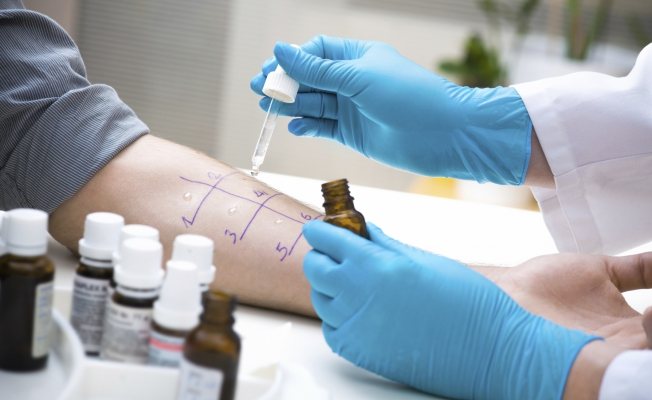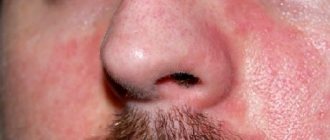Vitamins of any group are essential substances for our body. They ensure the full functioning of the nervous, digestive, and cardiovascular systems, strengthen the immune defense, improve vision (mainly twilight), and participate in blood clotting processes. Accordingly, we simply need them daily in prescribed quantities. However, each person’s body reacts individually, so the question remains quite relevant: can there be an allergy to vitamins? Of course it can, and we need to know more about it.
Products containing B vitamins: table
Vitamin B allergies can be caused by common foods commonly used in traditional cuisine. Some of them are also produced in the intestines: pantothenic acid (B5), pyridoxine (B6), biotin (B7), folic acid (B9). The rest comes from outside in the form of drugs or food.
| View | Products with the maximum content of B vitamins |
| IN 1 | Cereals (especially their shells - bran), green peas, nuts, dried fruits. Vegetables - beets, carrots, onions, cabbage, spinach, rose hips. |
| AT 2 | Meat, fish, milk, liver, eggs. Cereals - buckwheat, rice and wheat. Vegetables: green peas, yeast, almonds, cabbage. |
| AT 3 | Lean meat, liver, eggs, fish. Plant products: legumes, asparagus, peanuts, peppers, carrots, garlic, parsley, mushrooms. The vitamin content is higher in products of animal origin. |
| AT 5 | The largest amount of pantothenic acid is contained in green vegetables, as well as bran, meat, fish, dairy products, egg yolk, legumes, hazelnuts, and yeast. Royal jelly of bees is also recommended if you are not allergic to bee products. |
| AT 6 | Nuts, potatoes, cereal sprouts, spinach, carrots, cabbage, citrus fruits, strawberries, cherries. Animal origin - meat, poultry, fish, milk. |
| AT 7 | The largest amounts contain legumes, offal, nuts, cauliflower, and yeast. |
| AT 9 | Bran, leafy vegetables, legumes, honey. |
| AT 12 | Liver, eggs, fish, seaweed. |
In cases where an allergy to B vitamins is detected, any housewife can determine what to replace and limit in the menu the product containing the cause of the illness by selecting the desired line in the table. A healthy diet will help cope with symptoms and speed up recovery.
Provoking reasons
Heredity is the main cause of regularly recurring allergic rashes. The other is immunity. With a high degree of illness in a child, his immune functions suffer and allergic diseases develop. The third reason is the habitat:
- hygienic living conditions;
- ecological situation;
- contact with substances of chemical origin;
- pathologies of the central nervous system and digestive organs.
Causal relationships that provoke the development of allergic diseases to many vitamins have also been established:
- Intolerance to vitamin groups E and B, caused by a previous overdose.
- Similar reaction to vitamin D.
- A reaction to vitamin C occurs due to a deficiency of the enzyme glucose-6-phosphate dehydrogenase.
Vitamin B1 is especially dangerous for allergy sufferers. Its consumption is fraught with problems with the kidneys and liver.
People who are not prone to allergies suffer from rashes after taking multivitamin complexes. They contain a high concentration of vitamins, leading to a pseudo-allergic type reaction. Vitamin complexes with microelements included in their composition also threaten the development of allergies: metal salts, iron, copper. And of course, food colors, flavors, sweeteners, where would we be without them? Therefore, people who are prone to drug allergies should be extremely careful when choosing multivitamins. However, you can always contact your local police officer, who will recommend a safe vitamin and mineral complex.
Symptoms of vitamin allergy
Allergies to B vitamins manifest themselves with varying intensity. Depending on the type of manifestation, there are several types of reactions:
- skin lesions in the form of dermatitis, eczema, urticaria, intense itching from allergies;
- an increase in swelling up to Quincke's (the larynx is blocked, a very dangerous condition);
- spasm of the bronchial tree (suffocation like asthma);
- necrotic changes (death) of the skin and mucous membranes (Stephen-Jones and Lyell syndrome, respectively), with the threat of death.
The most common and indicative of individual vitamins are:
- allergy to B1 in the form of severe swelling of the face and mucous membranes;
- allergy to B3 (nicotinic acid) in the form of peeling, itching, urticaria, chest pain, swelling, shortness of breath to anaphylaxis, malfunction of the cardiovascular and digestive systems;
- allergy to vitamin B6 symptoms mainly in the form of dermatitis and urticaria, occasionally anaphylactic shock;
- an allergy to B9 is manifested by a widespread rash, swelling up to anaphylactic shock, asthma, which is especially dangerous for pregnant women due to its frequent use;
- allergy to vitamin B12 symptoms in addition to skin manifestations: nausea, vomiting, diarrhea, increased heart rate, vision and memory problems, drowsiness, irritability, headache.
Intramuscular administration is characterized by an allergic reaction in the form of local swelling, redness, and pain. In severe cases, numbness with swelling of the extremities, a sudden drop in blood pressure, suffocation, and acute abdominal pain are characteristic. Temperatures may increase.

How it manifests itself
Allergy symptoms vary depending on the individual. The most common allergic reaction is a rash.
It may appear within 2 weeks after starting the drug. In acute cases, symptoms appear several hours after taking the medicine and include rash, hives, or itching. However, in difficult cases, the signs of the disease can become even more aggressive. These include swelling of the nasal mucosa, rapid heartbeat, hypotension, difficulty breathing, facial swelling, and loss of balance.
This type of reaction is called anaphylactic shock and poses a real danger to the patient’s health. If no action is taken, it can be fatal within minutes.
In exceptional cases, the rarest type of allergy occurs, called serum allergy. The disease begins to manifest itself within a couple of days, and in some cases, a couple of weeks after starting to take a drug that has never previously entered the body.
Symptoms of serum sickness include rash, hives, fever and joint pain. In rare situations, this type of allergic reaction can destroy red blood cells. This is called hemolytic anemia.
Diagnostics
Diagnosing an allergy is quite simple if there is a strong reaction to a single drug. In other cases, doctors use:
- complete blood count to detect the number of eosinophils (increased number);
- blast transformation reaction of leukocytes;
- analysis for immunoglobulin E (characteristically increased);
- leukocyte alteration reaction;
- TSASK - test for basophil reactions;
- RIA – radioimmunoassay for the formation of antigen + antibody complexes;
- Intradermal tests with a minimal amount of allergen with assessment of the size of the papule after 30 minutes, then delayed for 48 hours by re-checking.
The test results will help the doctor determine if there is a connection between the suspected allergen and symptomatic manifestations. Next, you need to decide on treatment.

Effective treatments
In cases where an allergy to B vitamins is confirmed by diagnosis, treatment should begin by eliminating contact with the allergen. That is, completely exclude it from food and stop taking medications. If it is impossible to exclude B vitamins from the diet, they should be subjected to heat treatment sufficient to destroy the allergic substance.
For more intensive removal of excess B vitamins from the body, Enterosgel and Polysorb are used. Drinking plenty of fluids helps, as vitamins are water-soluble. In difficult cases, it is necessary to install a dropper and perform infusion therapy.
In the future, the allergist will select a suitable drug from the antihistamine group. Tools such as:
- "Diazolin"
- "Ketotifen"
- "Claritin"
- "Zodak"
- "Tsetrin"
- "Telfast"
The latest generations of antihistamine drugs are safer for the body and do not cause addiction or drowsiness. I would like to note the possibility of their over-the-counter dispensing from pharmacies.
If the effectiveness is insufficient, the doctor will write a prescription for hormonal medications containing dexamethasone and prednisolone. Self-medication with drugs from this group is dangerous.
Allergies accompanied by an asthmatic component can be relieved with the drug Allerginol Plus. For bronchospasm, the Ditek inhaler is used in combination with an antiallergic drug and salbutamol. Increased agitation will additionally be relieved by antiallergic drugs “Tavegil” and “Suprastin”, which are available with a doctor’s prescription.
In cases of swelling in the nose and lacrimation, preparations for intranasal use and eye drops containing cromoglycic acid (Lecrolin, High Krom, Cromoglin) are used. They do not cause side effects. In cases of severe swelling, decongestants are used in the nose (Tizin, Nazol), or sprays with mometasone, fluticasone (Mometasone - Teva, Forinex, Avamys, Fliconase).
It must be borne in mind that the manifestation of an allergy to B vitamins, accompanied by swelling and difficulty breathing, signals the need to urgently contact emergency medical services. Specialists will take the necessary measures to quickly eliminate increasing symptoms using injection forms.
If you are allergic to B12, acne can be lubricated with external products such as Fenistil Gel, or in more severe cases, hormone-containing products (Beloderm, Lorinden S). They can reduce the intensity of itching, eliminate rashes, and prevent scratches from becoming infected.

From one doctor to another: allergy to Flemoxin
Each of us, at least once in our entire lives, has turned to a doctor for help and received a treasured prescription with the ornate name of a life-saving medicine. Ampicillin, Ciprofloxacin, Levomycetin... Antibiotics. Substances intended...
Visitor comments
- no comments
Add a comment Cancel reply
Helpful advice
A common symptom of many diseases is severe hyperthermia. An increase in body temperature is a dangerous situation that can lead to disastrous consequences. This means that the patient needs to take antipyretic drugs. (No ratings yet) Loading......
Nicotinic acid was discovered in the 19th century, but began to be used for the treatment of diseases in the mid-20th century. Niacin is now used in the complex treatment of many neurological diseases. Like any medical...
Diaskintest is an alternative to the mantoux test. It is prescribed if there are contraindications to mantu, or if it is not possible to accurately establish a diagnosis. Allergies to the drug are rare, but can be severe and have consequences...
Preventive recommendations
Allergy to B vitamins has no specific prevention. Particular attention should be paid to compliance with dosages when taking medications prescribed by a doctor that contain this vitamin. Also, knowing about the increased sensitivity of your body, you should immediately inform the doctor about it during the examination.
It should be taken into account that doses increased for medicinal purposes are enhanced by the simultaneous intake of vitamins from food. If you are allergic to group B vitamins, you cannot decide on your own how to replace this or that multivitamin, as well as a monocomponent drug with a similar component prescribed by a doctor.
Remember that taking a multivitamin preparation can often be accompanied by an allergic reaction not to vitamin B itself, but to its combination with other components that form undigested complexes. A specialist has a better understanding of the variety of forms and combinations and will help you choose an appropriate drug individually, taking into account the characteristics of the body, age, and concomitant pathology. You should also exclude allergies to excipients used in the manufacture of the drug: dyes, stabilizers, flavoring agents, gelatin, which is quite difficult to do on your own.
It is worth paying attention to the immune system, being extremely careful in case of diseases such as liver or kidney failure (the reaction of the immune system to thiamine can provoke them). If you have a history of an allergic reaction to B vitamins, carefully read the labels on cosmetic products for their content. Also take into account the possibility of their increased content in finished products, as the manufacturer indicates on the packaging.
Vitamin preparations are useful when used wisely. As a result of incorrect selection and use, there is a provoked allergy and intoxication of the body (especially an allergy to B12). Do not overuse it. With a properly structured diet, additional B vitamins are not needed.
Allergic reactions to taking vitamins - how to find the “golden mean” and not harm the child?
Vitamins are an integral building material for every living organism. For full functioning, we need to receive a small amount of these important substances every day; with their deficiency, vitamin deficiency develops, which manifests itself in various kinds of disorders and diseases of the body.
At the same time, if there is an excess intake, an allergy to vitamins B CD and E may occur, with unpleasant and even life-threatening symptoms.

We are all accustomed to considering vitamins as a safe means of maintaining health, but studies have refuted this opinion - the mortality rate among those women who regularly took multivitamin complexes was twice as high as among those who did not take such drugs. The conclusion suggests itself - everything should be in moderation.
Children under 3 years of age are more vulnerable and susceptible to allergic reactions. It is at this age that an allergy to vitamin D generally occurs, since the child’s still immature body reacts particularly sharply to external and internal irritants. There are two types of allergies – food and contact.
Most often, allergies occur to vitamins B, C, D, the general symptoms of which are:
- intestinal disorder;
- scrofula or weeping diathesis;
- persistent diaper rash;
- frequent regurgitation;
- rash, itching, redness of the skin;
- up to suffocation, hysterical cough and even Quincke's edema.
Usually, the allergen enters the body of infants with food, so there is no need to rush and before introducing another complementary food to your baby, you need to consult a pediatrician.
Today, allergies to vitamin D in infants are quite common. Calciferol itself, in principle, cannot provoke diseases, but additional elements contained in its preparations can cause side effects.
Parents often confuse an excess of calciferol in infants with an allergic reaction to it, so it would be useful to know how an allergy to vitamin D manifests itself in children:
- these are various skin rashes with redness;
- itching accompanied by peeling;
- more serious symptoms – swelling of the mouth and larynx;
- cough, runny nose, shortness of breath;
- The worst thing is Quincke's edema.
All these symptoms indicate that you and your child should immediately consult a doctor, and in order to prevent an allergy to vitamins from appearing, strictly follow the pediatrician’s instructions and do not exceed the permissible dose of the drug.
Another fairly common allergen is B vitamins, and in particular its three representatives - B1, B6, and B12.
Thiamine (B1) is especially dangerous for the human body - an allergy to B vitamins in this case is accompanied by impaired functioning of the kidneys and liver, and acetylcholine released under the influence of this drug increases allergic manifestations several times.
Responsible for many functions in the body, B vitamins (B6 or B12) are vital for humans; they support the nervous system, increase resistance to stress, are responsible for cell division and growth, the immune system and much more. However, despite this, allergies to B vitamins are not uncommon.
Not often, but pyridoxine “disturbs the calm in the body”; an allergy to B vitamins can be caused by an overdose, but this happens extremely rarely, since the excess substance is excreted in the urine.
The main symptoms of the disease are hives accompanied by itching, tingling and numbness of the extremities, and possible circulatory problems. It is not worth excluding this drug (B12) for infants, since it is necessary for the child’s body; it is enough to simply follow the permissible dosage.
As well as to pyridoxine, an allergy to vitamin B12 occurs in infants and during pregnancy only in the case of a severe overdose. Cobalamin is a water-soluble substance that is excreted from the body along with fluid. Safe symptoms of an allergy to vitamin B12 are redness of the skin accompanied by itching. In moderate doses, it is also necessary for humans, especially to maintain mental activity and blood formation.

A direct allergy to vitamin C (ascorbic acid) is very rare, even for infants and during pregnancy. Corresponding manifestations occur when there is a deficiency of glucose-6-phosphate dehydrogenesis, a substance that is responsible for the body’s processing of vitamin C.
An allergy to vitamin C is accompanied by the following symptoms:
- skin rashes with redness and itching;
- swelling of the mucous membranes;
- rhinitis accompanied by cough;
- in a complex form - anaphylactic shock, Quincke's edema.
An increase in blood pressure and blood sugar may also occur. In any case, a home first aid kit should contain antihistamines in order to promptly relieve the symptoms of this disease, and in the case of complex forms of allergies, a person requires immediate assistance from specialists and resuscitation measures, otherwise death can occur in a matter of minutes. Manifestations of allergies can also be dangerous during pregnancy.
Although tocopherol belongs to the group of fat-soluble vitamins, which have a distinctive ability to be accumulated by the body, an allergy to vitamin E is extremely rare.
An overdose of this substance can cause digestive system disorders. Tocopherol itself is not toxic and even an allergy to vitamin E cannot cause serious harm to the body, therefore infant formulas and nutrient complexes during pregnancy are also enriched with this important substance. The only people who should be especially careful when taking vitamin E are people with diabetes.
In addition, there is an opinion that an allergy to vitamins (whether E or any other) during pregnancy is potentially dangerous for the unborn child, but this is not so - the placenta does not allow allergens to reach the fetus. The danger can arise after the birth of the baby and manifest itself as a genetically transmitted allergy (from mother to child) to a particular substance. In addition, a woman during pregnancy should take care in advance to protect herself from possible pathogens, since taking anti-allergy medications can affect the blood supply to the fetus.
Now you and I know whether a person can be allergic to vitamins. Any substance, including nutrients, can cause negative reactions in the body, however, if the permissible dosage and doctor’s recommendations are followed, the risk of allergic manifestations is significantly reduced.
Vitamin B-12 is taken as a supplement for people who lack the essential vitamin. Allergy to vitamin B-12 is uncommon but possible. Drugs. com states that B-12 is important for cell reproduction, growth and blood formation. If you have a known allergy to cobalt, or if you have been diagnosed with Leber's disease, you should not take a B-12 supplement. If you develop adverse reactions after taking a vitamin B-12 product, call your doctor to evaluate your symptoms. Some reactions may be side effects and not due to an allergy.
To adequately diagnose allergies, your doctor may recommend allergy tests to determine whether your body creates certain antibodies called immunoglobulin E, or IgE, according to the American Academy of Allergy, Asthma and Immunology. When you ingest a supplement, your body mistakenly perceives it as a dangerous substance and begins to defend itself against it with antibodies. Your immune system overreacts to the supplement and creates IgE antibodies that knock out the vitamin, resulting in histamine. Histamine is a chemical in the body that causes inflammation in the soft tissues, which leads to most allergy symptoms.
Vitamin allergies cause mild to severe symptoms soon after taking the supplement. Common signs and symptoms include headaches, itching, asthma, general fatigue, runny nose, skin rashes, wheezing, sniffing and sneezing. You may also develop digestive complications such as nausea, vomiting, diarrhea, cramps, stomach pain, and stomach pain. More serious symptoms include hives, difficulty breathing and swelling of the face, lips or tongue, Drugs says. com. Call your doctor if you experience any of these signs or symptoms. A severe allergic reaction can lead to life-threatening anaphylaxis.
Signs and symptoms may not be due to an allergic reaction. Drugs. com states that common side effects from taking vitamin B-12 include chest pain, unusual warmth in the arms or legs, rapid weight gain, headache, weakness, dizziness, numbness, nausea, diarrhea, pain, swelling, redness, fever, and stomach upset. To confirm vitamin B-12 allergies, your doctor may perform a skin prick test to determine whether your body creates IgE antibodies after exposure to a suspected allergen.
The most effective treatment for a vitamin B-12 allergy is to avoid consuming the vitamin. Your doctor may recommend including foods that contain B-12 to avoid the need for a supplement.
Post Views: 244







